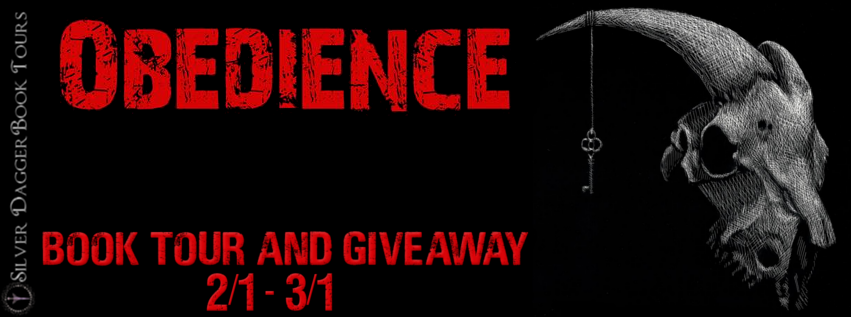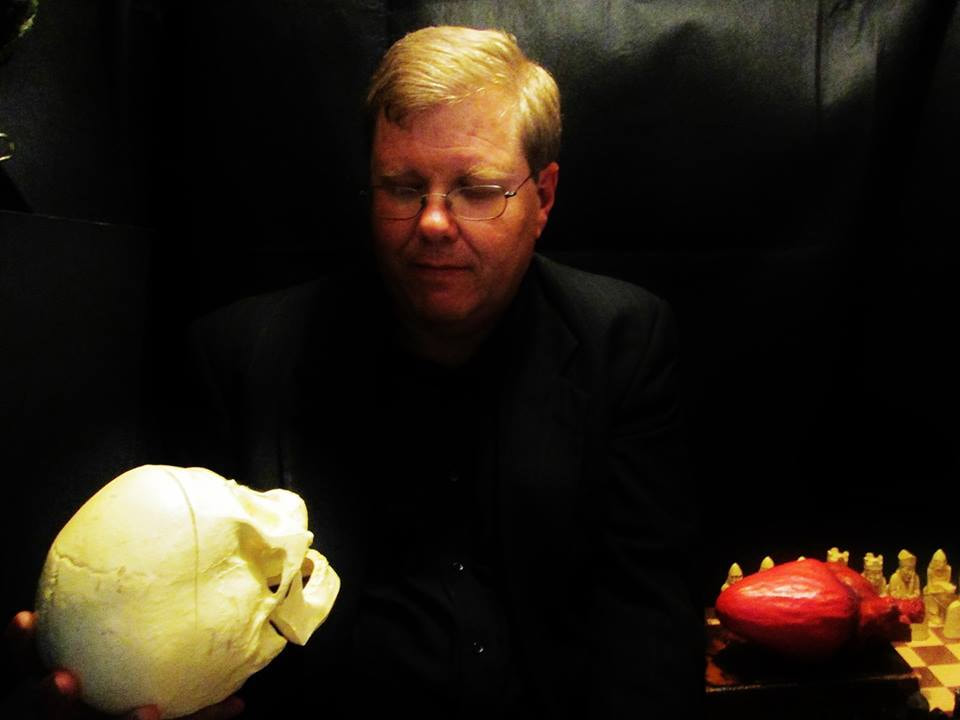Obedience
by
Michael Potts
Genre:
Horror
It
is a lazy summer day in the Appalachian foothills of Tennessee; much
like the day before, and the day before that. Everything seems normal
- at least on the surface; like an idyllic, pastoral painting; the
sky dyed with pastels of blue and white, the ground carpeted with
dark green fescue and bluegrass, a clapboard farmhouse resting on top
of a hill, sugar maples, oaks and Eastern red cedars providing
welcome shade from the heat of a Tennessee summer sun. You can almost
see moving images of little children running barefoot through the
grass; an era before tweeting and texting and the triumph of
technology over all.
Alas,
appearances lie.
Behind
the clapboard farmhouse sits a red barn, all bright and new looking;
fresh enough to lull a casual observer into believing it the benign
keeper of hey for cattle and shelter for goats. A closer look reveals
the color to be not barn red, but blood red.
Locals
tend to close their eyes when passing by that barn. Something is just
not right about it. Some say it is unnatural. Some say it's obscene
and evil. But they don't say such things out loud, for the owner of
the barn is Sheldon Sprigg, a well-respected man of the cloth, the
preacher at Hare’s Corner Church of God Incarnate. Sheldon is the
most upright man in these parts. He keeps the law religiously, and
makes sure his wife and teenaged daughter do too. After all, to obey
is better than sacrifice.
Still,
there's just something that not right about that barn.
Susie steps inside the barn, followed by Ginny. Susie always has to be the tough girl, Ginny thinks. A sliver of sun illuminates the light switch and Ginny flicks it, but there is no effect. “No surprise there,” she says. She flicks the switch back to the off position and looks around. What little sun gets in forms a shaft of light that illuminates floating dust specks. They switch on their flashlights and walk side by side on the dirt floor. Their beams reveal a hole about three feet wide in the back.
“Hey, dig that hole,” Susie says, and giggles.
Ginny groans. “That is a painful pun,” Ginny says. “It will burn in pun hell.”
“Shit,” Susie says, and Ginny bites her lip. “Even puns are damned in Tennessee. Poor puns, melting in hell.”
Ginny looks at Susie and smirks. She pauses, then says, “Let’s shine our lights down the hole. Maybe there’s something interesting there.”
“Interesting,” Susie says. “You sound like Paul. You two are perfect for each other.”
Ginny ignores Susie, and they shine their lights into the hole, which remains as black as a lightless cave. Ginny shivers. The blackness reminds her of the palpable darkness she experienced in Mammoth Cave. She had visited the caverns during a Science Club field trip, and the cave guide extinguished the lights to show just how dark the absence of light could be. It felt like the loss of hope. Until now she had never peered into such darkness.
Susie stares at the hole and says, “Geez, it’s like there’s no light coming out of our flashlights.” Ginny turns and checks the end of her flashlight, then Susie’s. “The lights are still shining - bright
LEDs. You’re right. Their light doesn’t make a dent in this dark. That’s really weird.” “Creepy as hell,” Susie says. “How deep do you think it is? It looks like a bottomless pit.”
“Umm,” Ginny says. “There are sinkholes around here where water ate away the limestone. They usually lead to underground caves, though most of those are full of water.” She sniffs and makes a face. “Ugh, what’s that smell?”
Susie kneels down and sniffs over the hole. She pulls back, holding her hand over her mouth and nose. “Stinks like burning sulfur. My dad, when he was around, read all the popular science rags and loved to show me things. He burned some sulfur outside one day. It made a cool blue flame, but it stunk like hell.”
“That’s what hell is, fire and brimstone,” Ginny says. “But I doubt this smell has anything to do with hell. There’s some sulfur water wells around here. I bet the stink is underground sulfur water.”
“How can people drink that shit?” Susie asks, but before Ginny can answer, her head clouds over as if a spider’s web were cloaking her mind. She grabs her head and says, “Ugh, I’m feeling funny.”
Susie stumbles and snatches a support beam. “Me, too. Getting dizzy. Bet that water in the hole has more than sulfur in it. Christ, we’re being poisoned.”
There is a ringing in Ginny’s ears like an alarm. She recalls the last time she heard that alarm, when she was picking blackberries from a grove in the field. She jumped back just in time to miss a rattlesnake’s lunge, the flat head stopping about an inch from her leg as the mouth snapped shut. The alarm grows louder, to the point that if her mind were ears, she would go deaf.
“We need to leave the barn. Now,” Ginny says. Ginny and Susie stagger toward the door, but they
stumble and fall, striking the front wall. They slide into a seated position, gulping air and staring at the barn’s interior. Susie breaks the silence. “Oh, shit. I was so dizzy. Like I was drunk. I know how that feels.”
“I don’t know how drunk feels,” Ginny says. “I know I can’t stand up. I’m not sure this is poison gas.
Something else in this barn is causing this. Maybe something alive?”
“You’re freaking me out, girl,” Susie says. “I hope it’s not something dead that can still slither.” “Now you’re freaking me out,” Ginny says. “Let’s try to slide toward the door.”
They scoot closer to the door, but before they go far the doors swing open and a man, pale and skeletal, trudges inside. He shuts the doors, moves to a corner Ginny thought was empty when she saw it earlier, and retrieves two long planks, which he sets against the doors to prop them shut. Ginny’s body jerks in surprise, and she tries to speak. Finally, she croaks, “Granddaddy? But you’re...dead.”
“Oh shit, I see him, too,” Susie says. The girls tremble, but the man behaves as if Ginny and Susie are not present. He moves to a dusty shelf and retrieves a rope that wasn’t there moments before. He throws it over a beam near the ceiling. It catches, and he pulls it taut. Then he walks to an empty corner and returns with a platform ladder, which he sets on the floor under the rope. He climbs the ladder, ties one end of the rope to the beam with a hard knot. He takes the other end and ties it with a hangman’s knot, forming a noose.
Ginny’s head tells her she can do nothing, that this deed happened long ago. Not even her Father in Heaven can reverse time, regardless of what Ginny’s illogical father on earth might think. Yet her heart wants to save this man, her granddaddy, from suicide and eternal damnation. Although she knew Katy, her classmate, who killed herself with pills last year, and did not want her to go to hell, Ginny could not shake her daddy’s logic on suicide. How can you repent of a sin if you don’t have a chance to repent? Since God does not forgive unrepented sin, ergo... Lately she wonders, though, whether people are not in their right minds when they kill themselves. Would God damn someone who doesn’t know what he’s doing? She doesn’t know for sure. But Granddaddy seems to know exactly what he’s doing.
Ginny whimpers at the thought of her granddaddy suffering in hell, so she gathers her voice and shouts, “No, Granddaddy! Not this!”
Her granddaddy ignores her. Ginny stands up, her body feeling like a lead lump, and forces herself forward. She reaches Granddaddy who has now placed the noose over his neck. She extends her hands to stop him, but they pass through Granddaddy’s body as if no one were there. Granddaddy steps off the ladder and hangs, but his neck does not break. His body twitches, writhing without purpose like a newly beheaded snake.
Ginny sobs, desperately grabbing at the empty space of the vision of Granddaddy’s body. The twitching stops. The man’s eyes bulge, and the tongue protrudes. His face turns purple, then black, and Ginny twists away, holding her stomach. She crawls to the hole in the floor and vomits into it. She inhales the noxious gas and backs away, barely able to move but manages to crawl back to Susie.
Immediately the barn door opens, and three goats stride inside, moving straight toward Ginny. She tries to shift out of the way, but her legs won’t budge. She extends her arms to block the coming blow. The goats reach her, their hoofs trampling the floor. Susie screams and tries to cover Ginny, but the goats pass through them as if moving through empty space, hoofs insubstantial as their bodies.
The goats climb Ginny’s granddaddy’s body as if it were a tree, their back hooves latching onto his trunk like the boot of an old fashioned telephone line repairman onto a pole. With their front hooves they gouge out Granddaddy’s eyes, leaving behind jelly-like remains of eyeballs, green-blue and mixed with clotted red blood. The goats climb down, looking like grotesque humans with goat heads. They reach the bottom and stand on their hind legs, their front legs dancing, leaving shadows on the floor like some obscene medieval Satanic Sabbat. Then they rumble outside, and the doors slowly shut on their own.
Ginny screams until her voice is hoarse, but no one arrives to help. Susie sits still, saying nothing. Nothing happens for a few minutes. Susie turns to Ginny and asks in a trembling voice, “Is it over?”
Michael
Potts grew up near Smyrna, Tennessee and is currently Professor of
Philosophy at Methodist University in Fayetteville, North Carolina.
His undergraduate degree (in Biblical languages) is from David
Lipscomb University. He also holds the Master of Theology from
Harding University Graduate School of Religion, the Master of Arts
(in Religion) from Vanderbilt University, and the Ph.D. in philosophy
from The University of Georgia. Michael has twenty articles in
scholarly journals, nine book chapters, six encyclopedia articles,
six book reviews, and he co-edited the book, "Beyond Brain
Death: The Case Against Brain Based Criteria for Human Death,"
which was published in 2000 by Kluwer Academic Publishers. He also
has over fifty scholarly presentations, including one presented at
the Pontifical Academy of Sciences at The Vatican in 2005. Michael is
a 2007 graduate of The Writers Loft at Middle Tennessee State
University and a 2007 graduate of the Odyssey Writing Workshop at St.
Anselm College in Manchester, New Hampshire. His poetry has been
published in Journal of the American Medical Association, Iodine
Poetry Journal, Poems & Plays, and other literary journals. His
poetry chapbook, "From Field to Thicket," won the 2006 Mary
Belle Campbell Poetry Book Award of the North Carolina Writers
Network. His creative nonfiction essay, "Haunted," won the
Rose Post Creative Nonfiction Award, also sponsored by the North
Carolina Writers Network. Besides reading and writing, he enjoys
vegetable gardening, canning, and ghost investigations. He and his
wife, Karen, live with their three cats, Frodo, Rosie, and Pippin, in
Linden, North Carolina.
Follow
the tour HERE
for exclusive excerpts, guest posts and a giveaway!












I would love to read your book.
ReplyDelete